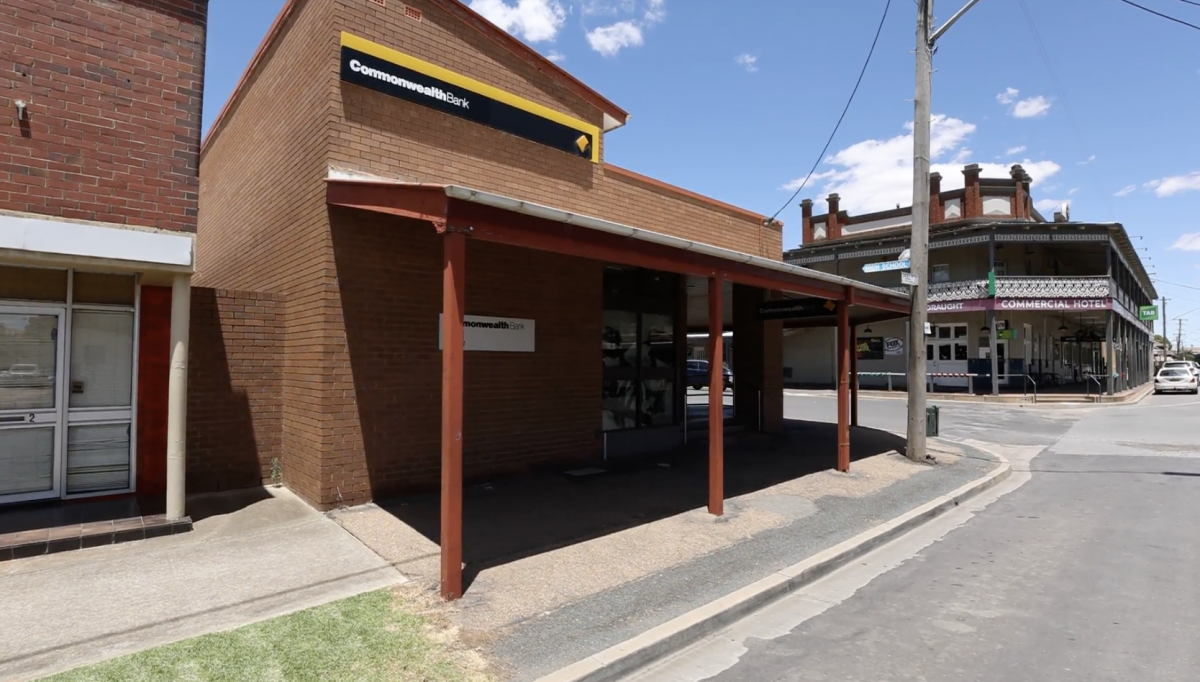
Neil and Rhiannon Druce of the Junee Licorice and Chocolate Factory are upset at the CBA closure in their town. Photo: Mia Gorsevski.
Junee Shire Council is fighting back against the Commonwealth Bank of Australia’s (CBA) decision to close the last remaining financial institution in its town.
CBA, who announced a $9.2 billion net profit last year, is pushing ahead with plans to permanently shut its Junee bank branch and ATM in March, despite pleas from residents who now face an hour-long round trip to Wagga for transactions and loan services.
Shire general manager James Davis said the decision was a warning to other small towns that they could be next.
“This will be the 700th bank branch to close in the past three years … if they maintain the same pace of closures, there are not going to be any branches left [in regional Australia] in three years’ time,” he said.
Researcher Dale Webster, who has monitored regional bank closures for years, agreed the Junee closure was an ominous sign for country NSW.
“I can’t work out why they picked Junee. It’s a growing town with a strong economy,” she said. “I’d be very worried if I was living somewhere where the Commonwealth Bank was the last bank in my town.
“They [CBA] are savage, they are showing no conscience.”
Junee is set to become the 597th small town in Australia to be left with no bank at all, according to data collected by Ms Webster, whose analysis reveals two-thirds of banks in regional Australia have closed since 1975.

The Junee CBA will close in March. Photo: Supplied.
She said the big four banks were “abandoning regional NSW”. The Junee decision follows Narooma losing its last National Australia Bank (NAB) and Yass losing its last Westpac in late 2022. The Riverina town of Berrigan lost its last financial institution in 2017, while Griffith residents were impacted with the closure of Bendigo Bank in 2020.
CBA claims the decision to close the Junee branch was due to falling customer numbers.
“After a recent review, we made the difficult decision to permanently close our Junee branch, which has had a 37 per cent drop in transactions over the five years before the coronavirus pandemic,” Norm Swift, regional general manager said.
Ms Webster disputes this.
“The figures are being engineered. Bank staff are on performance targets to stop serving customers. They’re penalised [if they serve too many].”
Mr Davis wants to see the evidence on transaction numbers.
“They won’t justify what they’re doing. They’re not transparent,” he said. “We put a surveillance officer in for [a two-week period]. The bank was opened for just 10.5 hours during that time and 628 people either entered the bank or used the ATM.”
CBA has said people would be able to do their banking at the local post office after the March bank closure.
But Rhiannon Druce, general manager of the Junee Licorice and Chocolate Factory, said there were limitations on what they would be able to deposit and withdraw.
“This would be a major safety issue for us and our employees having to transport large sums of cash to a bank 40 mins away in the township of Wagga where the nearest bank would be.”
Michael Commins, a Junee solicitor, said: “Some residents don’t drive and public transport is limited for the 80km round trip to the nearest bank in Wagga, some senior citizens lack computer skills, while an 88-year-old local only has a bank passport which the post office has advised they will not accept.”
Mr Davis said the post office did not provide services such as accessing bank cards and loans.
CBA did not answer a question from Region on whether Junee customers would face any additional fees and charges when they did their banking at the post office.
Mr Davis has called for a moratorium on bank closures.
“The Federal Government are allowing this to continue – it’s happening on their watch. We have written to MPs and Senators,” he said.
Ms Webster is now pushing for a Senate inquiry into regional banking and also called on the Federal Government to re-regulate the banks in a way that created legal obligations for them to service small towns.
Original Article published by Oliver Jacques on Region Riverina.









